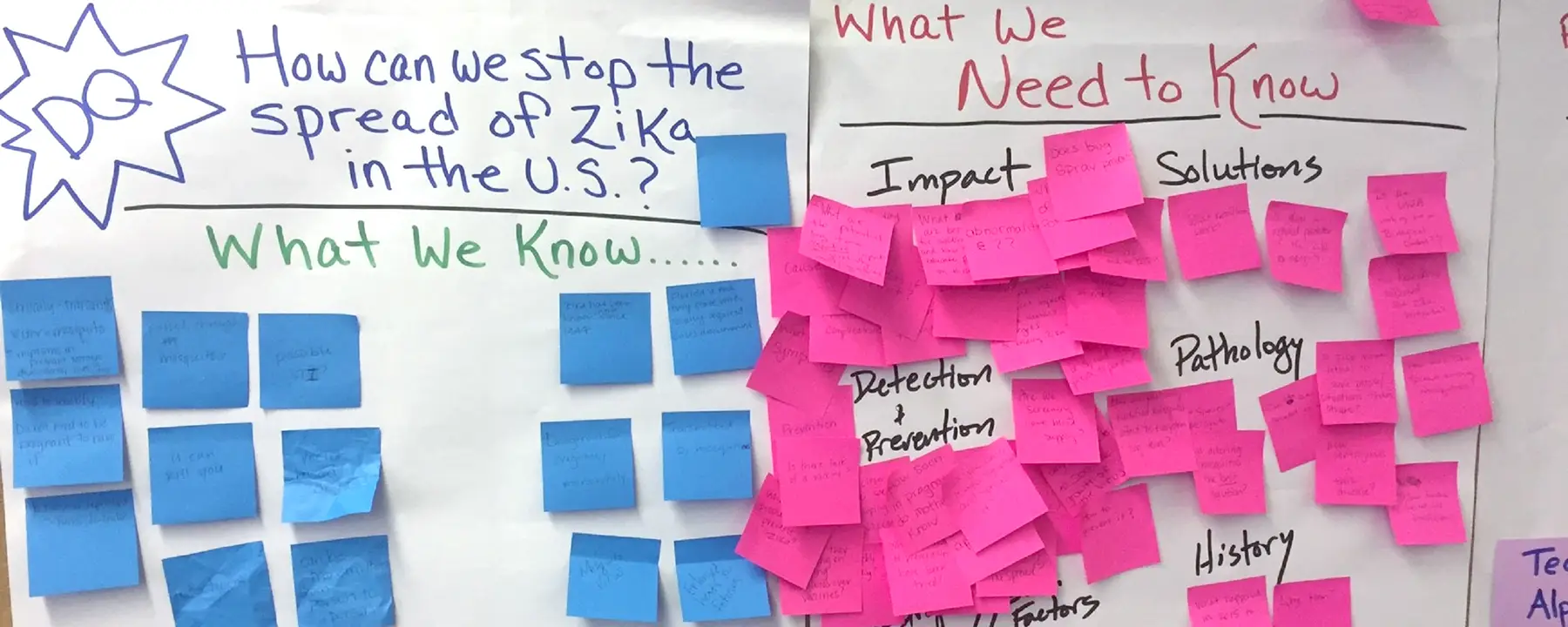How RTI is making an impact on K-12 education in North Carolina
In today’s competitive educational environment, school districts often find it difficult to make the switch to competency-based education (CBE) or to implement innovative instruction via project-based learning (PBL). Both CBE and PBL encourage students to take a more active role in their education, and they provide a variety of options for students to demonstrate that they have learned the expected knowledge and skills.
CBE is specifically designed to allow teachers to assess student performance according to specific and observable skills or competencies that must be mastered to ensure readiness and success for moving on (to the next competency, grade level, or course), while PBL entails an experiential approach to learning. Together, CBE and PBL are essential drivers in making education more personal for students through relevant and meaningful learning experiences.
In 2016, RTI partnered with Johnston County Public Schools (JCPS) in North Carolina to support this district’s strategic plan, JoCo 2020, a vision for what quality instruction should look like in JCPS classrooms by 2020. One of the goals of JoCo 2020 is to create a more personalized learning experience for all JCPS students by invoking the tenets of relevance, relationships, and innovation. The district considers CBE to be a sound strategic way to move forward a handful of innovative practices that were already in place, and to scale them so that they can be implemented across all 46 JCPS elementary, middle and high schools.
Competency-Based Education: Looking Beyond A’s, B’s, and F’s
One major component of CBE for JCPS is standards-based grading (SBG), which uses academic performance indicators that are observable and objective to communicate student progress throughout the year. In JCPS, this entails replacing the familiar A through F grading system with a four-letter system: M (mastery), P (progressing toward mastery), B (beginning to progress toward mastery), or N (not yet demonstrating progress).
Rather than a superficial change in grading metrics, SBG lays the groundwork for a personalized learning experience that engages the resources of teachers, administrators, and students and their families. For example, rather than simply seeing a letter grade on a report card, without any further explanation, parents receive specific feedback about what their child needs to know and what he or she needs to be able to do to be successful at the next grade level, or to move forward with the next set of learning targets or competencies. Students receive multiple opportunities to demonstrate mastery and have a better understanding of what their strengths are and where they need improvement.
JCPS had already implemented SBG in grades K–3, and in 2017 we supported the district in extending the rollout to the fourth grade. We facilitated professional development sessions so teachers could understand the reason for the move to SBG and what the current research says about standards-based teaching and learning in general (with grades being just one component). This was a good introduction to CBE for elementary school teachers who may not have understood the importance of changing how they grade, assess and teach students. We also provided professional development for elementary-school teachers (K-5) in June 2017, as well as one session for secondary-school teachers in August. We will continue to roll out this training for JCPS teachers in higher grades.
Project-Based Learning: Integrating the Educational Experience
For decades, the model for many American schools has been the traditional unit with occasional culminating projects: in, say, Social Studies class, students experience a cycle of lectures, activities and quizzes, ending in an individual, team or class project. PBL, by contrast, builds the curriculum around a specific project in which students address complex problems with informed solutions via an inquiry-driven learning process. Well-designed PBL units help students attain mastery of core content and build the skills critical to success in college, careers, and life.
PBL is an experiential approach to teaching and learning; for this reason, we take an experiential approach to helping teachers, coaches, and administrators develop the knowledge and skills needed to support PBL implementation. For example, our workshops with JCPS teachers and coaches immersed participants in simulated PBL units focusing on a range of real-world topics, including the Zika epidemic, opioid addiction, and the decimation of bee populations.
In each simulated unit, educators assume the student role and investigate a core driving question. In the course of exploring the answer, they learn about epidemiology, geography, science, and other subjects. In this way, participants begin to understand how PBL is a fundamentally different approach and why different tools and strategies are important to its effective design and implementation.
One major advantage of PBL is that it entails a large degree of collaboration, not only among students, but also teachers, administrators, families, and community stakeholders. An encouraging number of JCPS teachers volunteered to participate in the PBL training and coaching that we offered in 2017–2018, and a large new cohort will begin training in the summer of 2018 for the 2018–2019 school year. These teachers commit to implementing at least three PBL units during the school year, followed by job-embedded coaching and support. Also, in 2018, we will be training 40 district coaches to ensure that the JCPS initiative is eventually self-sustaining.
Building Consensus Among Parents, Teachers and Administrators
One of the main challenges of implementing CBE and PBL, in any district, is building consensus among employees and stakeholders. Teachers need to understand the benefits of CBE and PBL, and they need tools and strategies to help them effectively shift their practices to benefit students. Communication is important to help parents and students understand how the PBL learning experience differs from traditional approaches and how this system can lead to desirable outcomes for students.
Parents also need to understand the meaning of M, P, B, and N grades and the reasoning behind what could otherwise seem like major, inexplicable changes. For example, without A grades, schools will no longer have honor rolls, and high schools will use the Latin honors system (e.g., “cum laude,” “magna cum laude”) rather than having valedictorians and salutatorians.
In pursuit of the JoCo 2020 vision, we are currently supporting 22 JCPS schools, as well as numerous staff at the district office level, to implement and sustain these significant changes. We continue to facilitate strategic planning sessions, supply project management, deliver professional learning sessions for educators, and provide one-on-one and small-group coaching sessions for teachers. At the time JoCo 2020 was drafted, it may have seemed ambitious or even unattainable, but thanks to our ongoing partnership Johnston County is making personalized learning a reality for every one of its students.
- Johnston County Public Schools



